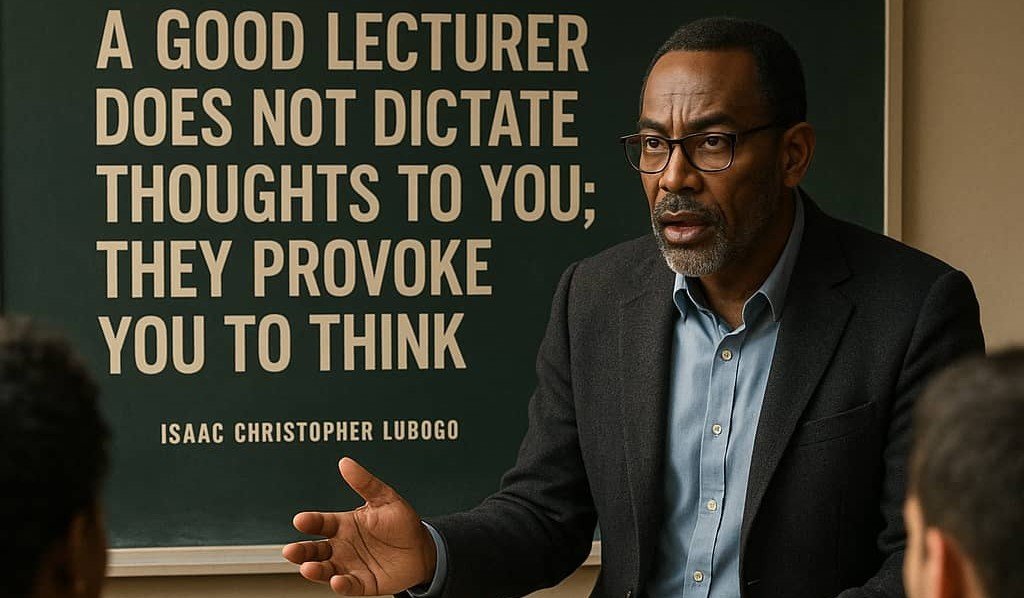By Isaac Christopher Lubogo
Introduction: The Death of the Dictator in the Classroom
> “The mind is not a vessel to be filled, but a fire to be kindled.” — Plutarch
The modern classroom stands at a philosophical crossroads. On one side lies the traditional didactic lecturer—the content sovereign who speaks, while students transcribe in silence. On the other side stands the provocative lecturer—the intellectual agitator who ignites inquiry and enables students to generate original thought.
The difference is not semantic. It is civilizational.
One instructs. The other awakens.
One builds compliance. The other cultivates cognitive rebellion.
In this context, the phrase “A good lecturer does not dictate thoughts to you; they provoke you to think” is not merely pedagogical wisdom—it is a call for the decolonization of learning, the humanization of teaching, and the democratization of the classroom.
1. The Fallacy of the All-Knowing Lecturer: An Epistemic Error
The lecturer who dictates what to think assumes that:
Knowledge is static
Truth is singular
Learning is linear
This model, rooted in banking education (Paulo Freire), reduces students to receptacles rather than co-creators of knowledge.
Such a lecturer forgets:
> Thinking is not imitation. It is construction.
By contrast, a lecturer who provokes thought:
Asks more questions than they answer
Encourages disagreement
Uses paradox, dilemma, and ambiguity as teaching tools
This model aligns with Socratic pedagogy, where:
> “The teacher is a midwife—not a mouthpiece.”
2. Thinking as the Ultimate Learning Outcome
The goal of higher education is not the memorization of facts, but the formation of thought frameworks.
Cognitive psychologists like Vygotsky and Piaget argue that critical thinking, metacognition, and abstract reasoning are the hallmarks of intellectual maturity.
A lecturer who merely dictates robs students of:
The ability to question assumptions
The habit of epistemic humility
The courage to innovate
But one who provokes thought invites cognitive dissonance—a key engine of learning.
> When students are made uncomfortable by new perspectives, the brain begins to construct, not copy.
3. Provocation as Pedagogical Method: Tools of the Thinking Lecturer
The best teaching aid is not PowerPoint.
It is not a textbook.
It is the question.
A good lecturer uses:
Rhetorical inquiry to stimulate debate
Case studies that resist clear answers
Simulations and hypothetical dilemmas to stretch moral reasoning
Philosophical and cultural dissonance to unseat inherited assumptions
The dialectic method to challenge passive agreement
This is the pedagogy of provocation, not imposition.
> A thinking lecturer teaches you how to think, not what to think.
4. Philosophical Grounding: The Ethics of Provocation
To provoke thinking is not to incite confusion. It is to exercise an ethical obligation—to empower learners with the ability to discern, construct, and reimagine.
The lecturer is not a judge delivering verdicts, but a philosopher creating the conditions for insight.
This is echoed by:
Immanuel Kant: “Enlightenment is man’s emergence from his self-imposed immaturity.”
John Dewey: “If we teach today’s students as we taught yesterday’s, we rob them of tomorrow.”
bell hooks: “The classroom remains the most radical space of possibility.”
The ethics of thought provocation is also anti-authoritarian. It resists the colonial classroom, the factory-model education system, and the logic of indoctrination.
5. Implications for African Classrooms and Legal Education
In the African context—especially in law, philosophy, political science, and development—thinking lecturers are an endangered species.
Students are taught to memorize the Constitution, but not question the legitimacy of power.
They know case law, but not the coloniality of the legal system.
They learn statutes, but not justice.
A good lecturer in this context must:
Challenge inherited colonial content
Expose students to Pan-African epistemologies
Use indigenous examples
Provoke students to rethink what “development” or “justice” truly means
> In short: teach beyond the syllabus. Teach truths, not just texts.
Conclusion: The Lecturer as Provocateur, Not Preacher
The most powerful lecturers are those who:
Leave students with questions, not conclusions
Awaken curiosity, not conformity
Inspire discomfort that leads to personal clarity
> The true measure of a lecturer is not how much content they cover—but how many minds they uncover.
In the end, dictation may lead to graduation.
But only provocation leads to transformation.
And that, ultimately, is the best teaching aid known to pedagogy:
Not a slide, not a script, but a spark.
Are we still university or a factory
# Suigeneris








